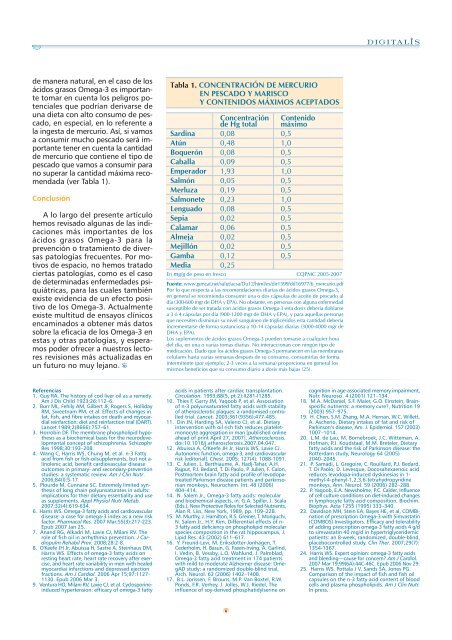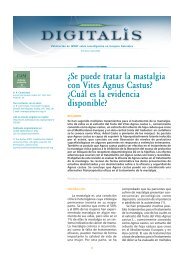Indicaciones terapéuticas de los ácidos grasos Omega-3 - Revista ...
Indicaciones terapéuticas de los ácidos grasos Omega-3 - Revista ...
Indicaciones terapéuticas de los ácidos grasos Omega-3 - Revista ...
Create successful ePaper yourself
Turn your PDF publications into a flip-book with our unique Google optimized e-Paper software.
xx<br />
<strong>de</strong> manera natural, en el caso <strong>de</strong> <strong>los</strong><br />
<strong>ácidos</strong> <strong>grasos</strong> <strong>Omega</strong>-3 es importante<br />
tomar en cuenta <strong>los</strong> peligros potenciales<br />
que podrían <strong>de</strong>rivarse <strong>de</strong><br />
una dieta con alto consumo <strong>de</strong> pescado,<br />
en especial, en lo referente a<br />
la ingesta <strong>de</strong> mercurio. Así, si vamos<br />
a consumir mucho pescado será importante<br />
tener en cuenta la cantidad<br />
<strong>de</strong> mercurio que contiene el tipo <strong>de</strong><br />
pescado que vamos a consumir para<br />
no superar la cantidad máxima recomendada<br />
(ver Tabla 1).<br />
Conclusión<br />
A lo largo <strong>de</strong>l presente artículo<br />
hemos revisado algunas <strong>de</strong> las indicaciones<br />
más importantes <strong>de</strong> <strong>los</strong><br />
<strong>ácidos</strong> <strong>grasos</strong> <strong>Omega</strong>-3 para la<br />
prevención o tratamiento <strong>de</strong> diversas<br />
patologías frecuentes. Por motivos<br />
<strong>de</strong> espacio, no hemos tratado<br />
ciertas patologías, como es el caso<br />
<strong>de</strong> <strong>de</strong>terminadas enfermeda<strong>de</strong>s psiquiátricas,<br />
para las cuales también<br />
existe evi<strong>de</strong>ncia <strong>de</strong> un efecto positivo<br />
<strong>de</strong> <strong>los</strong> <strong>Omega</strong>-3. Actualmente<br />
existe multitud <strong>de</strong> ensayos clínicos<br />
encaminados a obtener más datos<br />
sobre la eficacia <strong>de</strong> <strong>los</strong> <strong>Omega</strong>-3 en<br />
estas y otras patologías, y esperamos<br />
po<strong>de</strong>r ofrecer a nuestros lectores<br />
revisiones más actualizadas en<br />
un futuro no muy lejano.<br />
Referencias<br />
1. Guy RA. The history of cod liver oil as a remedy.<br />
Am J Dis Child 1923;26:112–6.<br />
2. Burr ML, Fehily AM, Gilbert JF, Rogers S, Holliday<br />
RM, Sweetnam PM, et al. Effects of changes in<br />
fat, fish, and fibre intakes on <strong>de</strong>ath and myocardial<br />
reinfarction: diet and reinfarction trial (DART).<br />
Lancet 1989;2(8666):757–61.<br />
3. Horrobin DF. The membrane phospholipid hypothesis<br />
as a biochemical basis for the neuro<strong>de</strong>velopmental<br />
concept of schizophrenia. Schizophr<br />
Res 1998;30:193–208.<br />
4. Wang C, Harris WS, Chung M, et al. n-3 Fatty<br />
acid from fish or fish-oilsupplements, but not alinolenic<br />
acid, benefit cardiovascular disease<br />
outcomes in primary- and secondary-prevention<br />
studies: a systematic review. Am J Clin Nutr.<br />
2006;84(l):5-17.<br />
5. Plour<strong>de</strong> M, Cunnane SC. Extremely limited synthesis<br />
of long chain polyunsaturates in adults:<br />
implications for their dietary essentiality and use<br />
as supplements. Appl Physiol Nutr Metab.<br />
2007;32(4):619-634.<br />
6. Harris WS. <strong>Omega</strong>-3 fatty acids and cardiovascular<br />
disease: a case for omega-3 in<strong>de</strong>x as a new risk<br />
factor. Pharmacol Res. 2007 Mar;55(3):217-223.<br />
Epub 2007 Jan 25.<br />
7. Anand RG, Alkadri M, Lavie CJ, Milani RV. The<br />
role of fish oil in arrhythmia prevention. J Cardiopulm<br />
Rehabil Prev. 2008;28:2-8.<br />
8. O'Keefe JH Jr, Abuissa H, Sastre A, Steinhaus DM,<br />
Harris WS. Effects of omega-3 fatty acids on<br />
resting heart rate, heart rate recovery after exercise,<br />
and heart rate variability in men with healed<br />
myocardiai infarctions and <strong>de</strong>pressed ejection<br />
fractions. Am J Cardiol. 2006 Apr 15;97:1127-<br />
1130. Epub 2006 Mar 3.<br />
9. Ventura HO, Milani RV, Lavie CJ, et al. Cyc<strong>los</strong>porineinduced<br />
hypertension: efficacy of omega-3 fatty<br />
Tabla 1. CONCENTRACIÓN DE MERCURIO<br />
EN PESCADO Y MARISCO<br />
Y CONTENIDOS MÁXIMOS ACEPTADOS<br />
Concentración Contenido<br />
<strong>de</strong> Hg total máximo<br />
Sardina 0,08 0,5<br />
Atún 0,48 1,0<br />
Boquerón 0,08 0,5<br />
Caballa 0,09 0,5<br />
Emperador 1,93 1,0<br />
Salmón 0,05 0,5<br />
Merluza 0,19 0,5<br />
Salmonete 0,23 1,0<br />
Lenguado 0,08 0,5<br />
Sepia 0,02 0,5<br />
Calamar 0,06 0,5<br />
Almeja 0,02 0,5<br />
Mejillón 0,02 0,5<br />
Gamba 0,12 0,5<br />
Media 0,25<br />
En mg/g <strong>de</strong> peso en fresco CQPMC 2005-2007<br />
Fuente: www.gencat.net/salut/acsa/Du12/html/es/dir1599/dd16977/6_mercurio.pdf<br />
Por lo que respecta a las recomendaciones diarias <strong>de</strong> <strong>ácidos</strong> <strong>grasos</strong> <strong>Omega</strong>-3,<br />
en general se recomienda consumir una o dos cápsulas <strong>de</strong> aceite <strong>de</strong> pescado al<br />
día (300-600 mgr <strong>de</strong> DHA y EPA). No obstante, en personas con alguna enfermedad<br />
susceptible <strong>de</strong> ser tratada con <strong>ácidos</strong> <strong>grasos</strong> <strong>Omega</strong>-3 esta dosis <strong>de</strong>bería doblarse<br />
a 3 ó 4 cápsulas por día (900-1200 mgr <strong>de</strong> DHA y EPA), y para aquellas personas<br />
que necesiten disminuir su nivel sanguíneo <strong>de</strong> triglicéridos esta cantidad <strong>de</strong>bería<br />
incrementarse <strong>de</strong> forma sustanciosa a 10-14 cápsulas diarias (3000-4000 mgr <strong>de</strong><br />
DHA y EPA).<br />
Los suplementos <strong>de</strong> <strong>ácidos</strong> <strong>grasos</strong> <strong>Omega</strong>-3 pue<strong>de</strong>n tomarse a cualquier hora<br />
<strong>de</strong>l día, en una o varias tomas diarias. No interaccionan con ningún tipo <strong>de</strong><br />
medicación. Dado que <strong>los</strong> <strong>ácidos</strong> <strong>grasos</strong> <strong>Omega</strong>-3 permanecen en las membranas<br />
celulares hasta varias semanas <strong>de</strong>spués <strong>de</strong> su consumo, consumirlas <strong>de</strong> forma<br />
intermitente (por ejemplo, 2-3 veces a la semana) proporciona en general <strong>los</strong><br />
mismos beneficios que su consumo diario a dosis más bajas (25).<br />
acids in patients after cardiac transplantation.<br />
Circulation. 1993;88(5, pt 2):II281-I1285.<br />
10. Thies F, Garry JM, Yaqoob P, et al. Association<br />
of n-3 polyunsaturated fatty acids with stability<br />
of atherosclerotic plaques: a randomised controlled<br />
trial. Lancet. 2003;361(9356):477-485.<br />
11. Din JN, Harding SA, Valerio CJ, et al. Dietary<br />
intervention with oil rich fish reduces plateletmonocyte<br />
aggregation in man [published online<br />
ahead of print April 27, 2007]. Atherosclerosis.<br />
doi:10.1016/j.atherosclerosis.2007.04.047.<br />
12. Abuissa A, O'Keefe JH Jr, Harris WS, Lavie CJ.<br />
Autonomic function, omega-3, and cardiovascular<br />
risk [editorial]. Chest. 2005; 127(4): 1088-1091.<br />
13. C. Julien, L. Berthiaume, A. Hadj-Tahar, A.H.<br />
Rajput, P.J. Bedard, T. Di Paolo, P. Julien, F. Calon,<br />
Postmortem brain fatty acid profile of levodopatreated<br />
Parkinson disease patients and parkinsonian<br />
monkeys, Neurochem. Int. 48 (2006)<br />
404–414.<br />
14. N. Salem Jr., <strong>Omega</strong>-3 fatty acids: molecular<br />
and biochemical aspects, in: G.A. Spiller, J. Scala<br />
(Eds.), New Protective Roles for Selected Nutrients,<br />
Alan R. Liss, New York, 1989, pp. 109–228.<br />
15. M. Murthy, J. Hamilton, R.S. Greiner, T. Moriguchi,<br />
N. Salem Jr., H.Y. Kim, Differential effects of n-<br />
3 fatty acid <strong>de</strong>ficiency on phospholipid molecular<br />
species composition in the rat hippocampus, J.<br />
Lipid Res. 43 (2002) 611–617.<br />
16. Y. Freund-Levi, M. Eriksdotter-Jonhagen, T.<br />
Ce<strong>de</strong>rholm, H. Basun, G. Faxen-Irving, A. Garlind,<br />
I. Vedin, B. Vessby, L.O. Wahlund, J. Palmblad,<br />
<strong>Omega</strong>-3 fatty acid treatment in 174 patients<br />
with mild to mo<strong>de</strong>rate Alzheimer disease: OmegAD<br />
study: a randomized double-blind trial,<br />
Arch. Neurol. 63 (2006) 1402–1408.<br />
17. B.L. Jorissen, F. Brouns, M.P. Van Boxtel, R.W.<br />
Ponds, F.R. Verhey, J. Jolles, W.J. Rie<strong>de</strong>l, The<br />
influence of soy-<strong>de</strong>rived phosphatidylserine on<br />
6<br />
cognition in age-associated memory impairment,<br />
Nutr. Neurosci. 4 (2001) 121–134.<br />
18. M.A. McDaniel, S.F. Maier, G.O. Einstein, Brainspecific<br />
nutrients: a memory cure?, Nutrition 19<br />
(2003) 957–975.<br />
19. H. Chen, S.M. Zhang, M.A. Hernan, W.C. Willett,<br />
A. Ascherio, Dietary intakes of fat and risk of<br />
Parkinson’s disease, Am. J. Epi<strong>de</strong>miol. 157 (2003)<br />
1007–1014.<br />
20. L.M. <strong>de</strong> Lau, M. Bornebroek, J.C. Witteman, A.<br />
Hofman, P.J. Koudstaal, M.M. Breteler, Dietary<br />
fatty acids and the risk of Parkinson disease: the<br />
Rotterdam study, Neurology 64 (2005)<br />
2040–2045.<br />
21. P. Samadi, L. Gregoire, C. Rouillard, P.J. Bedard,<br />
T. Di Paolo, D. Levesque, Docosahexaenoic acid<br />
reduces levodopa-induced dyskinesias in 1methyl-4-phenyl-1,2,3,6-tetrahydropyridine<br />
monkeys, Ann. Neurol. 59 (2006) 282–288.<br />
22. P. Yaqoob, E.A. Newsholme, P.C. Cal<strong>de</strong>r, Influence<br />
of cell culture conditions on diet-induced changes<br />
in lymphocyte fatty acid composition, Biochim.<br />
Biophys. Acta 1255 (1995) 333–340.<br />
23. Davidson MH, Stein EA, Bayes HE, et al, COMBination<br />
of prescription <strong>Omega</strong>-3 with Simvastatin<br />
(COMBOS) Investigators. Efficacy and tolerability<br />
of adding prescription omega-3 fatty acids 4 g/d<br />
to simvastatin 40 mg/d in hypertriglyceri<strong>de</strong>mic<br />
patients: an 8-week, randomized, double-blind,<br />
placebocontrolled study. Clin Ther. 2007;29(7):<br />
1354-1367.<br />
24. Harris WS. Expert opinion: omega-3 fatty acids<br />
and bleeding—cause for concern? Am J Cardiol.<br />
2007 Mar 19;99(6A):44C-46C. Epub 2006 Nov 29.<br />
25. Harris WS, Pottala J V, Sands SA, Jones PG.<br />
Comparison of the impact of fish and fish oil<br />
capsules on the n-3 fatty acid content of blood<br />
cells and plasma phospholipids. Am J Clin Nutr.<br />
In press.



